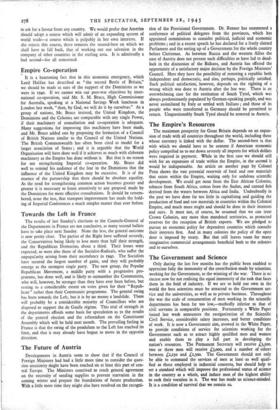Empire Co-operation
It is a heartening fact that in this economic emergency, which Lord Halifax has described as " the second Battle of Britain," we should be made as sure of the support of the Dominions as we were in 1940. If we cannot win our post-war objectives by inter- national co-operation, said Mr. S. M. Bruce, High Commissioner for Australia, speaking at a National Savings Week luncheon in London last week, " then, by God, we will do it by ourselves." As a group of nations, Mr. Bruce insisted, the United Kingdom, the Dominions and the Colonies are comparable with any single Power, if their machinery of consultation and co-operation is adequate. Many suggestions for improving this machinery have been made, and Mr. Bruce added one by proposing the formation of a Council of British Nations similar to the Council of the United Nations. The British Commonwealth has often been cited as model for a larger association of States ; and it is arguable that the World Organisation will have done well if it achieves as much with elaborate machinery as the Empire has done without it. But that is no reason for not strengthening Imperial co-operation. Mr. Bruce did well to remind his audience of the fear in the Dominions that the influence of the United Kingdom may be excessive. It is of the essence of the partnership that there should be absolute equality. As the need for strengthening common action becomes greater and greater it is necessary to listen attentively to any proposal made by the Dominions for more effective consultations. It should be remem- bered, none the less, that transport improvement has made the hold- ing of Imperial Conferences a much simpler matter than ever before.


























 Previous page
Previous page